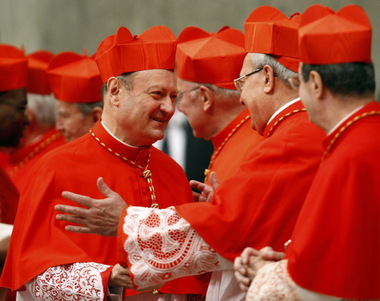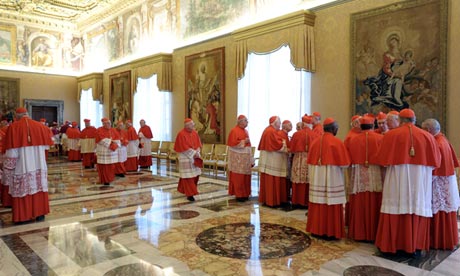VATICAN CITY -- From 2002 to 2007, Cardinal Gianfranco Ravasi wrote a daily column in the Italian Catholic daily Avvenire.

The column, called "Mattutino" or "morning prayer," offered a short thought for the day, and was often accompanied by a quote drawn from an array of authors. It ranged from the Psalms to obscure contemporary poets, from Christian writers to contemporary novelists and philosophers.
It was through the "Mattutinos" that most Italian Catholics first came to know Ravasi, then the director of an historic library in Milan, and discovered his blend of encyclopedic interests and knack for finding a spiritual "opening" even in the most un-Christian writers.
The fame as a moderate liberal he enjoyed within some Catholic circles could have scuppered his chances for a Vatican career, but Pope Benedict XVI came to appreciate Ravasi.
In 2007, he appointed him head of the Vatican department for culture, with the task of reopening the dialogue between the Catholic Church and contemporary secularized culture.

Pope Benedict used last night's Ash Wednesday mass to deliver a withering and extraordinary blast at the warring factions in the Vatican's upper-echelons, whose power struggles many believe influenced the Pontiff's historic decision to stand down.
Earlier on Wednesday, during the general audience, the Pontiff had alluded to the need for church figures to avoid the temptations of power and privilege.
But yesterday evening his warning was clearer. “We must reflect on how the face of the Church is marred by sins against unity and division of the ecclesiastical body. We must overcome individualism and rivalry,” he told great and the good of the curia assembled in St Peter’s Basilica. “The true disciple does not serve himself or the public, but the Lord.
“Many are ready to get on their high horse over scandals and injustices – obviously committed by others – but few seem able to act according to the real wishes of their own hearts and consciences.”
Pundit Gerard O’Connell of the Vatican Insider said: “This was a very, very, clear and strongly worded speech. It was an appeal for an end to the personal rivalries and of people competing to put themselves in high profile positions. I think Benedict is passing messages to the cardinals and to those who will succeed him.”
Cheikh Bechara Jaffal el Khazen of Zouk Mikael is the son of Jaffal, son of Moussa son of Tarabieh, son of …
Khazen History


Historical Feature:
Churches and Monasteries of the Khazen family

St. Anthony of Padua Church in Ballouneh
Mar Abda Church in Bakaatit Kanaan
Saint Michael Church in Bkaatouta
Saint Therese Church in Qolayaat
Saint Simeon Stylites (مار سمعان العامودي) Church In Ajaltoun
Virgin Mary Church (سيدة المعونات) in Sheilé
Assumption of Mary Church in Ballouneh
1 - The sword of the Maronite Prince
2 - LES KHAZEN CONSULS DE FRANCE
3 - LES MARONITES & LES KHAZEN
4 - LES MAAN & LES KHAZEN
5 - ORIGINE DE LA FAMILLE
Population Movements to Keserwan - The Khazens and The Maans
ما جاء عن الثورة في المقاطعة الكسروانية
ثورة أهالي كسروان على المشايخ الخوازنة وأسبابها
Origins of the "Prince of Maronite" Title
Growing diversity: the Khazin sheiks and the clergy in the first decades of the 18th century
Historical Members:
Barbar Beik El Khazen [English]
Patriach Toubia Kaiss El Khazen(Biography & Life Part1 Part2) (Arabic)
Patriach Youssef Dargham El Khazen (Cont'd)
Cheikh Bishara Jafal El Khazen
Patriarch Youssef Raji El Khazen
The Martyrs Cheikh Philippe & Cheikh Farid El Khazen
Cheikh Nawfal El Khazen (Consul De France)
Cheikh Hossun El Khazen (Consul De France)
Cheikh Abou-Nawfal El Khazen (Consul De France)
Cheikh Francis Abee Nader & his son Yousef
Cheikh Abou-Kanso El Khazen (Consul De France)
Cheikh Abou Nader El Khazen
Cheikh Chafic El Khazen
Cheikh Keserwan El Khazen
Cheikh Serhal El Khazen [English]
Cheikh Rafiq El Khazen [English]
Cheikh Hanna El Khazen
Cheikha Arzi El Khazen
Marie El Khazen
